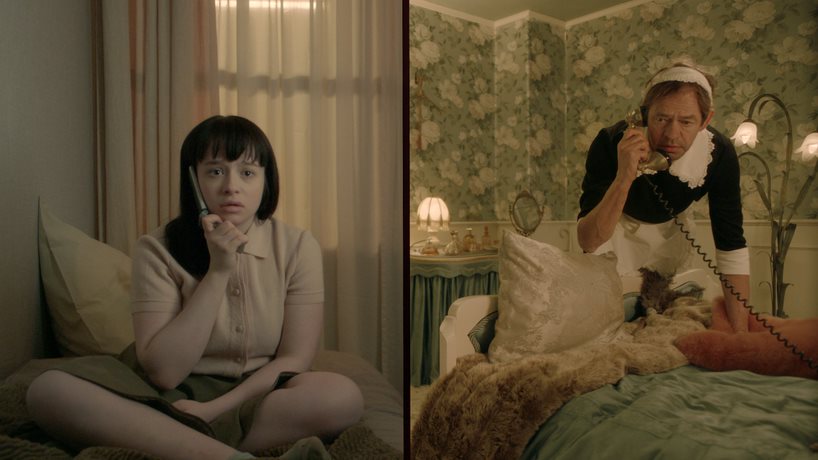Our fourth round of quick reviews from GFF takes in a satire which takes Jaques‘ line in As You Like It, ‘All the world’s a stage, and all the men and women merely players.’ almost literally. We also take a gloomy Nordic road trip with a dead pensioner, and return to serious fare in a sensitive drama about a woman rebuilding her life after a terrorist attack.
The Ordinaries (Sophie Linnenbaum/ Germany/ 2022/ 120 mins) just about maintains its high-concept conceit for its lengthy two hour runtime. This often baffling but hugely imaginative comedy drama is set in an alternate reality in which life is one huge film production. In this world, humanity is broken down in a kind of cinematic caste system. The Main Characters, Supporting Characters, and the despised Outtakes. Paula (Fine Sendel) lives with her Supporting Character mother, and has grown up believing herself to be the daughter of a famous Main Character, and is studying at Main Character School so she can emulate him. On discovering her father may not be who she thought, she embarks on a quest that till take her into the Outtakes’ ghetto, where revolution appears to be brewing.
Sophie Linnenbaum’s anarchic class satire is initially a real delight, with its social commentary woven into the film’s very concept without being polemical, and the barrage of film references a constant joy for the film lover. For any cinephile who has bored their less obsessed friends rigid in the past, the adoption of all kinds of film jargon into regular demotic speech is a dream come true. It’s full of great ideas like a boy who keeps jump-cutting uncontrollably, and a ‘miscast’ maid who is an Outtake in a French maid’s outfit. There’s always something to grab the eye. Unfortunately, it all becomes almost too much of a good thing as the sheer volume of ideas thrown about means it doesn’t always follow its own internal logic, and the sprawling narrative isn’t quite as impressive as the world building. Still, that world building is exceptional. 3/5
Less imaginative is Driving Mum (Hilmar Oddsson/ Iceland/ 2022/ 113 mins), a distinctly Nordic deadpan comedy in the mould of Aki Kaurismäki. Existing in some glum no-man’s-land between Weekend at Bernie’s and The Three Burials of Melquiades Estrada, Driving Mum tells the story of middle-aged Jon (Þröstur Leó Gunnarsson) who sets off across Iceland with his recently-deceased mother propped up in the back seat of his knackered jalopy. Driving Miss Pushing-Up-Daisies, if you will. It’s an intermittently blackly humorous film that simply fails to sustain its runtime.
The misanthropic Jon is a hard protagonist to warm to. He’s not exactly talkative, and is more-or-less abrupt and rude to everyone he comes into contact with. Thankfully, Mum (Kristbjorg Kjeld) is more loquacious. A stiff, martially erect presence even without the rigor mortis, she’s a nightmarish backseat driver who micro-manages Jon’s journey in his head, intent on making sure she’s laid to rest in the place she’s requested. There’s much chewing over opportunities not taken, and regrets curdled into resentment, but too much in the way of standard road movie tropes, and not enough moments of real invention. More scenes like a surly stand-off on a narrow road between Jon and some German tourists, with Mum screeching, ‘Are you going to back down to a pack of Nazis?’ from the back seat, would have been welcome. As it is, the few moments of inspiration, and some suitably frigid monochrome photography, aren’t enough to sustain this rather interminable trek. 2/5
The brilliant Virginie Efira anchors another film at GFF after Other People’s Children. This time it’s Proxima director Alice Winocour‘s Paris Memories (France/ 2022/ 103 mins). Inspired by the experience of Winocour’s brother, who was caught up in the coordinated attached that included the Bataclan shooting, it’s a tasteful and studiously observed narrative on a harrowing subject. Efira plays Mia, a survivor of an armed attack on a French brasserie. Her trauma is so great that she’s blocked most of the event from her mind, yet if festers in her subconscious and is slowly poisoning her relationship with her husband. A meeting with a group of survivor’s, including Benoît Magimel’s Thomas, begins to trigger her memory. As she pieces together the awful night, she begins to sense a chance to begin to heal herself, if not her marriage.
Winocour opens Paris Memories with the shooting itself, and it’s difficult to tell if that’s a good choice or not. On the one hand, the film is otherwise restrained to a fault, but the visceral nature goes a fair way to getting across the terror and horror of it all. It is on secure ground in the aftermath, with the dependably emotive Efira navigating her memory and her feelings with care and empathy. Less solid narratively is the friendship blooming into attraction with Thomas. Both Efira and Magimel have plenty chemistry, and it’s understandable how a shared tragedy would draw too people together – and widen existing cracks in other relationships – but it doesn’t deal with the obvious emotional weight that comes with it. The film also tips unavoidably towards a melodramatic final act. That said, the detective-like structure of Mia’s search to piece together the events provides a narrative propulsion that was missing in the relatively inert Proxima. And if the ending hits some solid weepy territory, Efira’s supple, compassionate performance more than earns it. 3/5
All film screened as part of Glasgow Film Festival 2023


Comments